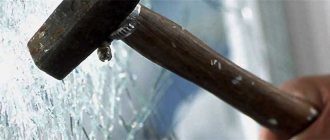These articles of the Criminal Code of the Russian Federation are based on a provision that has the authority to protect the rights and legitimate interests of individuals and organizations if they have suffered from a crime related to damage to their valuables. In this case, the property can appear in any form.
Art. 35 of the Constitution of the Russian Federation states that the right to private property must be protected by law, and the state must provide victims with access to justice and payment of compensation based on the damage caused. A crime that results in damage to property belonging to another person is considered dangerous - destruction or damage to someone else's property.
Intentional damage to valuables is punishable by criminal liability in accordance with Art. 167 of the Criminal Code of the Russian Federation. The legislator, on the basis of this article, clearly defines the placement under protection of the property of the injured person. Significant damage is the reason for the obligatory element of the crime. The object is someone else's material values. This article also provides for criminal punishment for intentional damage or destruction of someone else's property with significant damage.
In my legal practice, I often acted on the side of the guilty party, defending the accused, and on the side of the victim, who needed full compensation for the harm caused in court (more information about filing a civil claim in a criminal trial is on the main part of the site).
Criminal or administrative liability for damage to someone else's property?
What is destruction? These are any actions that lead to the complete destruction of an object, when it cannot be restored and is unsuitable for further use. What is property damage? This concept means harm to things that do not have significant weight in connection with consumer value. Also, destruction or damage to property due to negligence is of a certain nature: depending on the degree of damage, it can be used in a damaged state, or restored to its original condition. The punishment for a crime of negligence is regulated by Art. 168 of the Criminal Code of the Russian Federation.
Consequently, deliberate damage to property that does not entail significant damage can be considered petty hooliganism, therefore, criminal liability for destruction or damage to someone else’s property is not provided for in this case.
If property assets are destroyed with significant losses, then a fine of up to five thousand rubles, but no more, will be levied on the guilty person.
The differences between criminal and administrative liability for damage or destruction of someone else's property are determined based on the amount of damage caused by unlawful actions; in this case, the total amount should not exceed five thousand rubles.
At the same time, the legislator has established only one demarcation measure and does not depend on the actions of the offender, that is, for liability to occur, it does not matter what the person did - broke glass, scratched a car, damaged clothing or other property of a citizen, the main thing in this case is only the amount of damage. Any violation of the rights of the accused should not go unnoticed; returning the criminal case to the prosecutor in accordance with Article 237 of the Code of Criminal Procedure of the Russian Federation is just one of the methods of struggle, which I advise you to consider using the link.
Private property and its protection
Modern legislation of the Russian Federation, in contrast to the laws and legal acts of the Soviet Union, recognizes and confirms the human right to own private property. And since this right is given to him, the state assumes obligations to protect him. Because only a person who owns property has the legal right to dispose of it as he pleases. Including damaging and destroying it at will. Any other person, intentionally or unintentionally, damaging someone else's private property will be punished as prescribed by law.
Each of the Codes that deal with the protection of human life and his rights has a separate article regulating a person’s responsibility for damage to someone else’s property. In the Administrative Code of the Russian Federation, this is Article 7.17, which refers to the federal law, which is numbered 195.
The main thing to remember is that the right to private property is the right of every citizen and no one has legal grounds to alienate it. Yes, the property itself can be confiscated, but not the right to own it.
Important fact
Each case of property damage is unique and it would be better if it is confirmed by some pre-existing precedents. In another situation, the proceedings in this case may be very delayed.
And it is important to note what exactly is meant when they talk about damage or destruction of property. Damage to property - actions that led to any damage to property, external or internal. And these damages do not allow the owner to enjoy the full functionality of the damaged item until the appropriate repairs are carried out. Destruction - property has been reduced to such a state that it is completely impossible to use it for its intended purpose.
After an incident of property damage, intentional or unintentional, has occurred, you need to decide where to file a claim for compensation? It must be submitted at the actual place of residence of the offender. But, depending on the severity of the damage caused, the claim must be filed in different courts. If the damage is estimated at less than 50,000 rubles, then the claim must be filed with a magistrate. In all other cases, he is sent to the district court.
Determining the amount of damage to damaged or lost property
When investigating the event described above, an appraisal is used to determine the amount of damage to lost property.
When carrying out this examination, the expert assesses the value of the damaged or destroyed item at the time of its damage, taking into account its wear and tear, assesses the possibility of restoration and the cost of this repair.
In this case, the specifics of the valuation of each property are determined based on the type of property:
- If the object of damage is an item of clothing, then in this case the assessment is made using the surviving payment documents for this product;
- The most common subject of valuation is a car, in this case the make, year of manufacture, mileage, technical condition of the car and other parameters are taken into account, taking into account which the expert determines the value of the lost property;
- When assessing real estate, an expert uses various valuation methods, the most common is the comparative method, based on which the cost of the premises is determined based on the cost of similar real estate in a given region;
- If it is impossible to evaluate the goods by an expert and the payment documents are lost, in some cases the victim’s explanation of the amount of damage is used.
In this case, the person who committed this act as part of his defense can receive his own expert opinion, on the basis of which he can challenge the materials available in the case, and also demand that the examination be re-appointed.
ATTENTION : watch a video about defending the rights of the accused by a lawyer and subscribe to our YouTube channel, you will have access to free legal assistance from a lawyer through comments on the video.
Intentional destruction or damage to someone else's property
Employees of the Oktyabrsky District Prosecutor's Office analyzed the practice of checking the legality of procedural decisions to refuse to initiate a criminal case made by the police department for the Oktyabrsky District of the Ministry of Internal Affairs of Russia in Barnaul, which indicates that every tenth such decision was made on the basis of damage to someone else's property, as a rule this is car.
According to the senior assistant prosecutor of the Oktyabrsky district O.B. Kruchina, Part 1 of Article 167 of the Criminal Code of the Russian Federation provides for criminal liability for the intentional destruction or damage of someone else's property if these acts entailed causing significant damage. At the same time, according to paragraph 2 of the note to Article 158 of the Criminal Code of the Russian Federation, significant damage to a citizen is determined taking into account his property status, but cannot be less than five thousand rubles.
The legislator understands destruction of property as rendering it unusable without the possibility of restoration and repair. Damage means the impossibility of full use of property, the functional properties of which can be restored through repairs. The crime is considered completed from the moment of committing deliberate actions aimed at destroying or damaging someone else’s property.
Thus, the legislator determines the need for complete destruction, or the infliction of such damage as a result of which the thing loses its properties and cannot be used for its intended purpose, with the obligatory sign of causing significant damage, based on the value of the destroyed (or damaged) thing.
The subjective side is characterized by intentional guilt (direct intent) in terms of intentional destruction or damage to someone else’s property and a careless form of guilt in terms of causing death to a person and other grave consequences.
The qualifying criteria include the same actions committed out of hooligan motives, by arson, explosion or other generally dangerous method, or which through negligence resulted in the death of a person or other grave consequences (Part 2 of Article 167 of the Criminal Code of the Russian Federation).
According to the resolution of the Supreme Court of the Russian Federation dated 06/05/2002 No. 14 “On judicial practice in cases of violation of fire safety rules, destruction or damage to property by arson or as a result of careless handling of fire”, if in the event of destruction or damage to someone else’s property by arson or other generally dangerous in a way the perpetrator foresaw and wanted or did not want, but consciously allowed the occurrence of such consequences of his act as the death of a person or causing harm to the health of the victim, the act constitutes a set of crimes provided for in Part 2 of Article 167 of the Criminal Code of the Russian Federation, depending on the intent and the consequences that occurred .
Grave consequences caused by negligence as a result of the intentional destruction or damage of property (part two of Article 167 of the Criminal Code of the Russian Federation) include, in particular, the infliction of serious harm to the health of at least one person through negligence or the infliction of moderate harm to the health of two or more persons;
leaving victims without housing or means of subsistence; long-term suspension or disruption of the work of an enterprise, institution or organization; long-term disconnection of consumers from life support sources - electricity, gas, heat, water supply, etc.). NEWS FEED
Liability for damage or destruction of someone else's property
The guilty person is punished regardless of how the crime was committed and what was guiding him at that moment. This can be destruction of property by arson, use of physical force, piercing and cutting objects, etc. A particularly dangerous crime is also taken into account when there is a threat of destruction of military property or a threat to the lives of others.
Thus, the difference between criminal and administrative punishment lies in the amount of damage caused, to determine which in most cases, depending on the situation, various examinations are carried out - technical, economic, etc.
To prove guilt , it is necessary to establish a cause-and-effect relationship between the actions of the offender and the damage caused.
If a crime aimed at damaging property is part of another crime of a criminal nature, then in this case the scale of the damage does not matter; criminal liability is applied to the perpetrator.
The subject of this type of offense can be any legally competent person who has reached the age of sixteen. Proceedings in these cases are heard by magistrates.
Separately, it is necessary to reflect the guilt of the actions of the person who committed the offense; in this case, law enforcement agencies should prove that this person acted intentionally, while it is the law enforcement agencies that collect the evidence base.
However, this circumstance cannot be the basis for a passive attitude towards what happened on the part of the participant in this event, although it legally provides for exemptions from proving innocence, but it is active actions to prove one’s innocence or the absence of intent to damage or destroy the property of another citizen that can be avoided criminal or administrative liability.
Do not forget that there is also criminal liability for carelessly causing damage to someone else’s property, but in this case, in addition to intent, a number of other factors are determining, namely:
- the cost of damaged or destroyed property must exceed two hundred fifty thousand rubles
- in this case, a special method of damaging property must be used, using fire or another source of increased danger
In other cases, in case of damage or destruction of someone else's property, only civil liability arises.
Types of responsibility, Administrative Code
It is worth noting that in the case of property damage, a big role is played by how significant the damage is. The Administrative Code of the Russian Federation considers only those cases where such damage was of an insignificant scale. This limit is indicated in Article 158 of the Criminal Code, in note number 2. It says that the damage that is estimated at more than 5,000 rubles will be significant. Any other damage, the value of which is less than the specified amount, caused to private or municipal property will be considered by the Administrative Code.
Liability for damage to property, which is regulated by the Code of Administrative Offenses of the Russian Federation, is specified in Article 7.17. It says that for causing damage to property, private or municipal, a person will be punished with a fine of 300-500 rubles, depending on the significance of the damage caused.
The act, which is the main document for registering an offense, will be drawn up by a law enforcement officer who goes to the scene. The form of this act will vary depending on the nature of the offense. For example, a document confirming the infliction of material damage does not have a form legalized by the state, so it is drawn up arbitrarily, but in compliance with the following structure:
- The date when the document was compiled, the place and exact time of its preparation;
- Who drew up the damage report, name, full rank;
- A list of property damaged by the attacker, the nature of the damage caused;
- The reason for the attacker’s actions, if this can be determined;
- The name and surname of the person who is charged with causing the damage, if his identity has been established;
- Signatures of all people who participated in the inspection of the damaged property;
After a law enforcement officer draws up the relevant act, it will be sent for judicial review.
note
When assessing the damage caused, not only the actual value of the damaged property is taken into account. It is also important to pay attention to the income level of the victim, the resources that need to be spent on repairs and, importantly, the significance of the damaged property.
Criminal liability occurs when the damage caused to a person is estimated at more than 5,000 rubles. In this case, the punishment that will be applied to the offender will take on a wider scope. In accordance with Article 167 of the Criminal Code of the Russian Federation, this can be a fine of 40,000 rubles, compulsory and correctional labor, and even imprisonment for up to 5 years. It all depends on how great the damage was and whether the plaintiffs’ health was affected.





